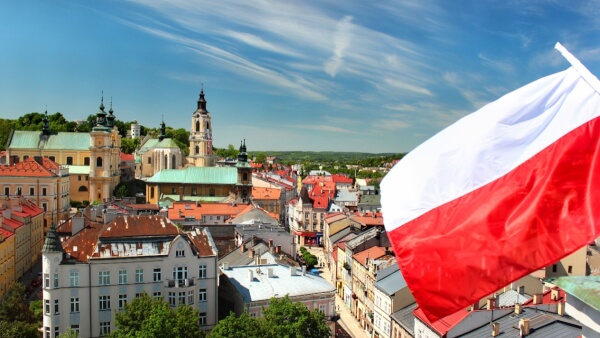Inheritance tax in Poland: What you need to know
Discover everything you need to know about inheritance tax in Poland. Our comprehensive guide covers the rates, who pays, how to calculate, and much more.

Often overlooked thanks to its close proximity to more glamorized European countries, those who live in Poland can sometimes feel like they’ve stumbled on the continent’s best kept secret.
Known for little but it’s wartorn history, the reality of Poland is far removed from the image many people have of the eastern-European gem. For instance, many people fail to recognize Poland for its breathtaking landscapes, with major national parks and protected areas sprawling across miles and miles of grassy hills. It’s often forgotten that there are few places you could enjoy a close-knit, European lifestyle less expensively. People don’t often think of Poland for its cafe culture, nightlife or fresh foods movement; but all of these things are the realities, and it’s no surprise that many expats would seek to make their ties to the country more official through citizenship.
If you’ve been living in Poland or are moving to Poland for work, to start a business, or just to enjoy all the country has to offer, it’s important to understand what processes you must go through in order to obtain citizenship. This guide will walk you through all the most important steps and tips for making permanent ties with Poland.
Many expats living in Poland don’t have citizenship, but instead hold either a Permit to Settle or a Long-Term EU Resident Permit. Both permits act as permanent residence in Poland, and holders enjoy all of the same rights within the country that native Poles do, with two notable exceptions.
Permanent residents in Poland may not vote in parliamentary or presidential elections, and they may not carry a Polish passport.
These differences are rather superficial, especially since holders of a Long-Term EU Resident Permit may live, travel and work freely within the EU without needing an EU passport. However, citizenship does give expats more control of their own futures in their right to vote, and it also ensures the continuity of your life in poland- having a citizenship revoked is extremely rare and nearly impossible. As such, it’s still advisable for long-term residents to pursue one, if only to cement their ability to remain in Poland permanently without restrictions or possible loss of residency status.
Polish citizens are allowed to hold both their Polish citizenship and citizenship in another country, and are subject to the same rights and obligations of Poles who hold only one citizenship.
It’s important for any citizenship applicant, however, to understand whether their country of origin allows and recognizes dual citizenship, to ensure they’ll not be required to forfeit that citizenship when they apply for one in Poland. Citizenship seekers from the U.S., UK, and most of Europe (with some exceptions) don’t need to worry about renouncing their home citizenship, but that isn't true universally and it’s best to familiarize yourself with your country’s dual citizenship laws before beginning your application in Poland.
Hands down, the simplest way to obtain Polish citizenship is through parents. If you were born to at least one parent who was a Polish citizen at the time of your birth, you’re eligible to be recognized as a Polish citizen yourself. This is called “right of blood.”
If you weren’t born to a Polish parent, however, there are still many ways to achieve citizenship in the European country, as follows.
A foreign citizen who holds a permanent residence permit and has been living legally in Poland for a minimum of three continuous years, who has employment in Poland and who owns a home is eligible to apply for citizenship.
Tip: Use this resource to learn more about what qualifies as an uninterrupted stay to determine your eligibility.
A foreigner who has been living legally in Poland for two uninterrupted years and is married to a Polish citizen is eligible for Polish citizenship.
A refugee who was legally granted long-term residence in Poland is eligible to apply for citizenship after living in the country for two continuous years.
If your parent had forfeited their Polish citizenship at the time of your birth, but has since had it restored and both you and your parent are living in Poland, you’re eligible to claim your own Polish citizenship.
Any foreigner who has been living legally by means other than a permanent residence visa in Poland for a minimum of 10 years is eligible for Polish citizenship
One of the most important aspects of applying for Polish citizenship is proving that you have achieved fluency in the Polish language. That command of the language must be confirmed with an official certificate, which is issued upon successful completion of a state examination. For foreigners who attended an international school in which the main language of instruction was Polish, a school-leaving certificate may suffice. Otherwise, an applicant is required to take the level B1 exam as issued by the State Commission for the Certification of Proficiency in Polish as a Foreign Language.
With a language certificate in place, the following documents must be submitted to the Voivode with jurisdiction over your place of residence in Poland:
Assuming all of your paperwork is in order and you’re a qualified applicant, your case should be resolved “immediately,” or in a couple of days. If you need to submit more documents or your case needs any additional investigation, it’s still processed within a month, or two months in extremely complicated cases.
For the most part there are almost no fees associated with applying for Polish citizenship, outside of the 219 PLN stamp duty. While that sum isn’t too hefty, it can add up when you’re also paying international fees to fund the transaction from your foreign bank account. It’s a good idea to use Wise to get the real exchange rate and cut out expensive international bank transfer fees during this process.
That’s it! Good luck on becoming a Polish citizen!
*Please see terms of use and product availability for your region or visit Wise fees and pricing for the most up to date pricing and fee information.
This publication is provided for general information purposes and does not constitute legal, tax or other professional advice from Wise Payments Limited or its subsidiaries and its affiliates, and it is not intended as a substitute for obtaining advice from a financial advisor or any other professional.
We make no representations, warranties or guarantees, whether expressed or implied, that the content in the publication is accurate, complete or up to date.

Discover everything you need to know about inheritance tax in Poland. Our comprehensive guide covers the rates, who pays, how to calculate, and much more.

Everything you need to know about moving to Poland from the UK. Read about visas, popular expat destinations, healthcare and more.

The complete guide to buying property in Poland as a foreigner. Read about how to buy Polish property, average prices, fees, and more.

The government of Poland has opened its borders to refugees arriving from the ongoing war in Ukraine. So anyone who is escaping from Ukraine and reaches the...

Poland, as well as other EU member states on the border with Ukraine, opened on February 24, 2022 to receive refugees. The Government of Poland, state...

A complete guide to selling your property in Poland, including the process, fees, taxes and more.